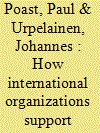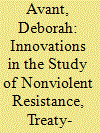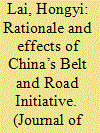|
|
|
Sort Order |
|
|
|
Items / Page
|
|
|
|
|
|
|
| Srl | Item |
| 1 |
ID:
138421


|
|
|
|
|
| Summary/Abstract |
Democratization in the developing world is, according to Samuel Huntington, “an important—perhaps the most important—global political development of the late twentieth century.” While scholars of comparative politics have explored the domestic political economy of democratic transitions, they, along with scholars of international relations, also recognize that international actors, particularly international organizations (IOs), are crucial for successful political transformation.
|
|
|
|
|
|
|
|
|
|
|
|
|
|
|
|
| 2 |
ID:
160472


|
|
|
|
|
| Summary/Abstract |
The third issue of JoGSS’ third volume opens with a special, guest-edited section introducing new ways to explore nonviolent resistance—a form of conflict in which unarmed persons use a wide variety of coordinated tactics to push for change without harming others. As Braithwaite and Braithwaite note in their introduction to the special section, the quantitative study of nonviolent resistance has recently become much more prominent in the field. They curated for this issue a series of new studies that disaggregate actors and tactics to uncover new insights regarding the role of ethnic power relations on the participant bases of nonviolent and violent resistance campaigns, the role of fear of victimization in patterns of mobilization, the effects of state response in protest dynamics, the role of national trade unions in the duration and outcomes of nonviolent campaigns, and the role of the United Nations in the diffusion of norms of nonviolence across secessionist movements.
|
|
|
|
|
|
|
|
|
|
|
|
|
|
|
|
| 3 |
ID:
107534


|
|
|
|
|
| Publication |
2011.
|
| Summary/Abstract |
Can the application of domestic law by bureaucracies in powerful states alter policy dynamics globally? Courts and regulatory agencies with jurisdiction over large markets routinely impose national rules to conduct transpiring outside of their physical borders. Such extraterritoriality has expanded to issues ranging from antitrust to the environment. Proponents claim that extraterritorial acts can have far-reaching international consequences, spilling over into the domestic political economy of regulation in target states. Skeptics, however, question the effects of these sanctions against internationally mobile actors. In this study, we offer the first quantitative analysis of extraterritorial intervention for global policy convergence. In particular, we construct an original time-series panel data set to test the association between extraterritorial actions by U.S. prosecutors and the national enforcement of foreign bribery regulations in target countries. Our empirical analysis finds strong statistical evidence linking extraterritoriality to national policy implementation, with jurisdictions that experienced a U.S. intervention being twenty times more likely to enforce their national rules. The findings suggest the important influence that domestic law in powerful states may have for global cooperation in general and sheds light on the key pillars of international anticorruption efforts in particular.
|
|
|
|
|
|
|
|
|
|
|
|
|
|
|
|
| 4 |
ID:
121764


|
|
|
|
|
| Publication |
2013.
|
| Summary/Abstract |
This paper argues that a significant reframing of global poverty is likely to emerge in the next decade as world poverty becomes less about the transfer of aid and more about domestic distribution and thus domestic politics. This proposition is based on a discussion of the shift of much of global poverty towards middle-income countries. There are questions arising related to how countries are classified and to administrative capacities, as well as to domestic political economy, but it is argued that many of the world's extreme poor already live in countries where the total cost of ending extreme and even moderate poverty is not prohibitively high as a percentage of gdp. By 2020, even on fairly conservative estimates, most of world poverty may be in countries that do have the domestic financial resources to end at least extreme poverty; this could imply a reframing of global poverty.
|
|
|
|
|
|
|
|
|
|
|
|
|
|
|
|
| 5 |
ID:
178782


|
|
|
|
|
| Summary/Abstract |
The existing literature suggests that China’s rationale for the belt and road initiative was to stimulate infrastructural investment abroad and thus economic growth at home, foster economic ties with Eurasia, and counter the US pivot to Asia. Employing a domestic political economy perspective, this article suggests that the Belt and Road Initiative (BRI) aimed to address China’s three following vulnerabilities that could derail its economic growth and threaten its political regime—industrial surplus capacity, massive imports of energy through maritime transport instead of safer land routes, and under-development of the western region. Addressing these vulnerabilities helps to sustain China’s economic model characterised by heavy reliance on investment and exports, protection of state firms, and massive energy input. Post-2012 data suggest that the BRI has partially mitigated these three vulnerabilities.
|
|
|
|
|
|
|
|
|
|
|
|
|
|
|
|
| 6 |
ID:
120878


|
|
|
|
|
| Publication |
2013.
|
| Summary/Abstract |
This paper examines the question of whether a country's exchange rate policy choices are influenced by membership in preferential trade agreements (PTAs). We argue that PTAs, by constraining a government's ability to employ trade protection, increase its incentives to maintain monetary and fiscal autonomy in order to manipulate the domestic political economy. Consequently, we contend that countries are less likely to adopt or sustain a fixed exchange rate when they have signed a PTA with their "base" country-the country to whom they have traditionally fixed the currency or the major industrial country to whom they have the most extensive trade ties. Likewise, countries that have signed a "base" PTA also tend to have more depreciated/undervalued currencies, as measured by the level of the real exchange rate. Using data on 99 countries from 1975 to 2004, we find strong support for these hypotheses. These findings shed light on the complex relationship between different types of macroeconomic policies in the contemporary world economy. More broadly, they speak to the question of whether international agreements are credible commitment mechanisms when close policy substitutes exist at the domestic level.
|
|
|
|
|
|
|
|
|
|
|
|
|
|
|
|
|
|
|
|
|